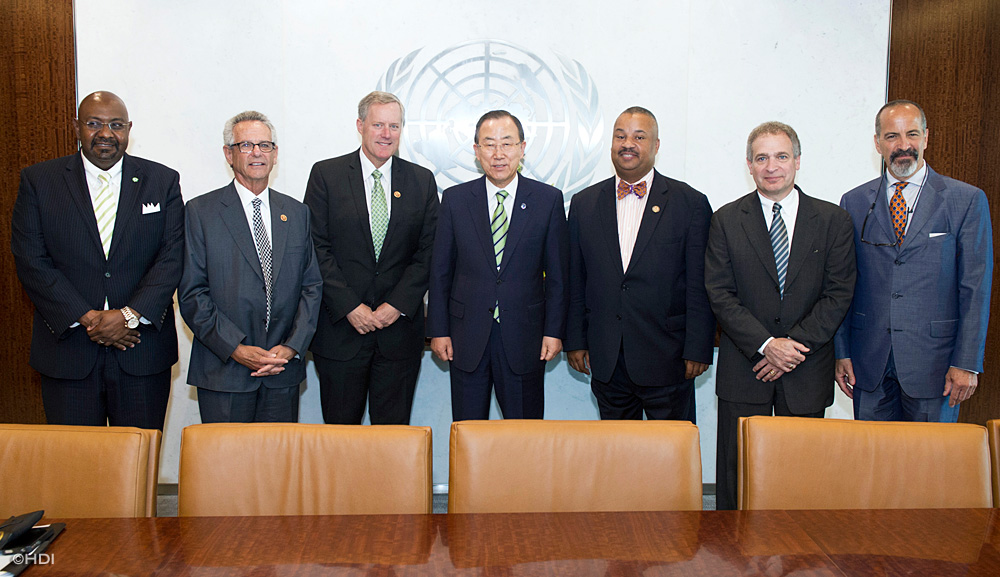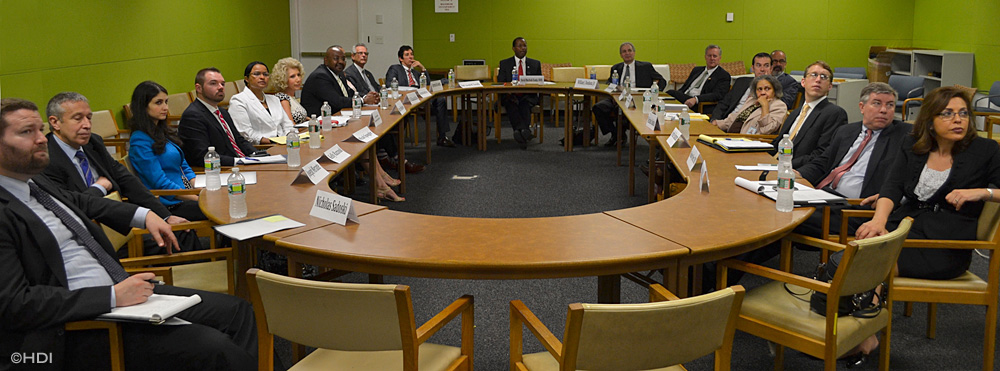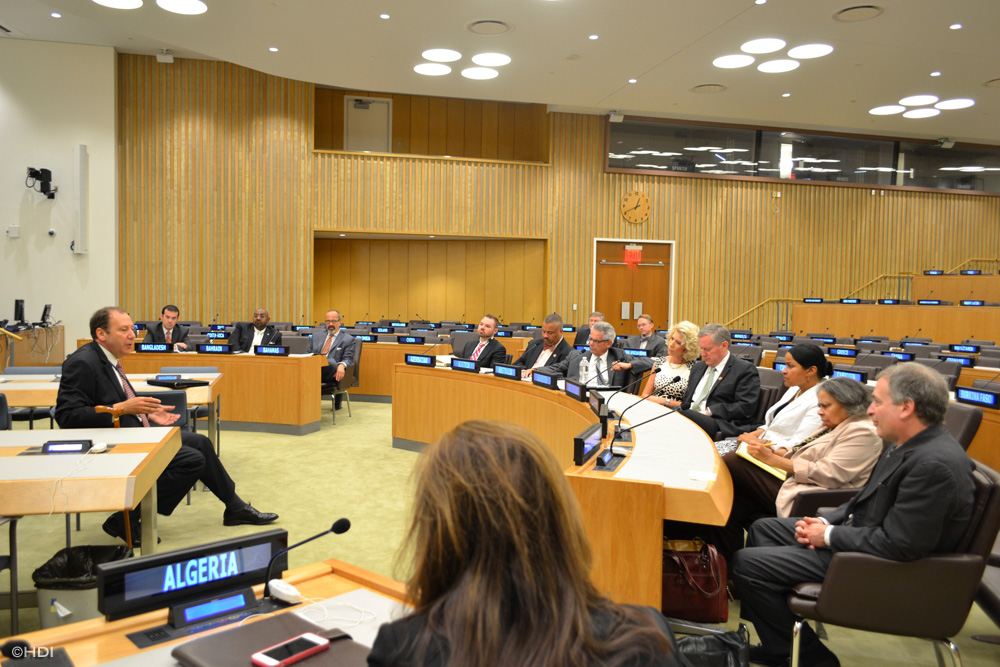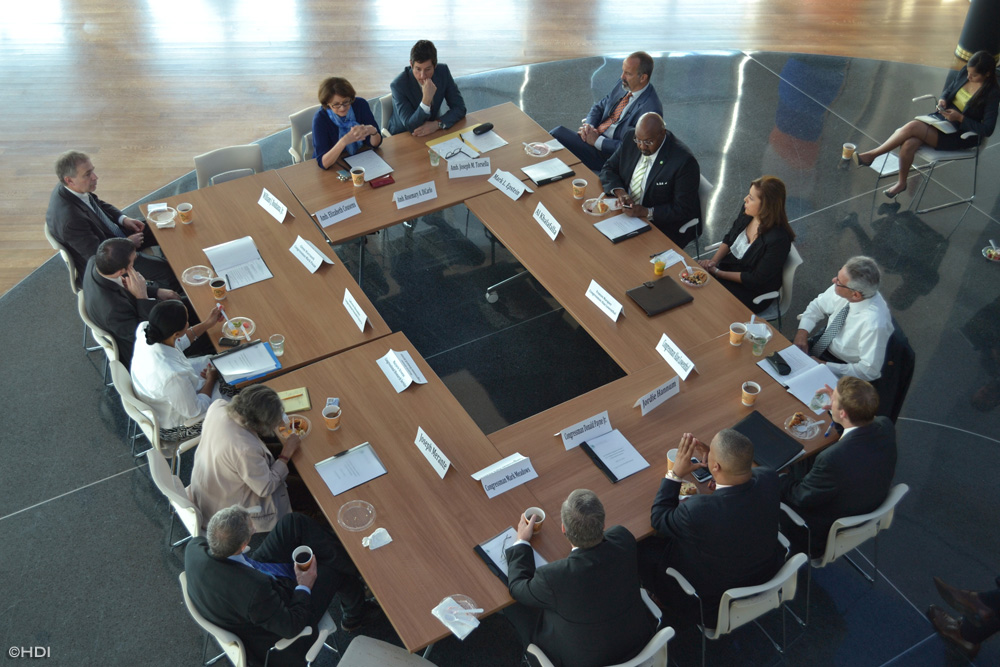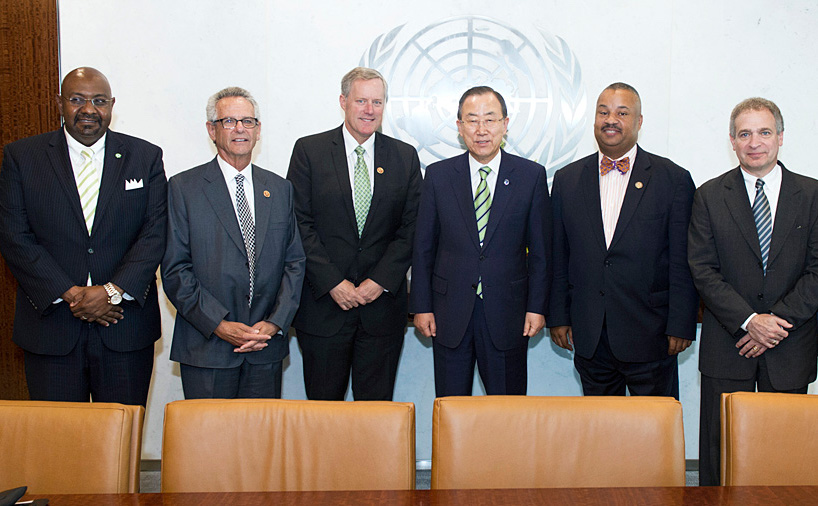
(l.to r. HDI Chair Dr. Al Khalafalla, Rep. Alan Lowenthal (D-CA) , Rep. Mark Meadows (R-NC), UN Secretary General Ban Ki-moon, Rep. Donald M. Payne, Jr., HDI Board Director William Rouhana)
HDI Meeting with UN Secretary-General Ban Ki moon June 24, 2013
(l.to r. HDI Chair Dr. Al Khalafalla, Rep. Alan Lowenthal (D-CA), Rep. Mark Meadows (R-NC), UN Secretary-General Ban Ki-moon, Rep. Donald M. Payne, Jr., HDI Board Director William Rouhana)
As is The Humpty Dumpty Institute’s custom, the first event of the day was a working breakfast hosted by the United States Mission to the United Nations. Ambassador Rosemary DiCarlo, U.S. Deputy Permanent Representative to the United Nations discussed the emphasis that the United Nations placed on humanitarian issues, especially in Sudan, South Sudan and Syria. Following that U.S. Ambassador and Representative for Management and Reform to the United Nations, Joseph Torsella discussed why the U.N. is an indispensable institution and the special interest that the United States has in the organization, given that it is one of its founding members. Ambassador Torsella also discussed the various steps that are being taken within the U.N. to reduce costs and ensure financial efficiency.
Following the breakfast briefing at the USUN participants proceeded to the United Nations Headquarters where Mr. David Kanja, Assistant Secretary-General, provided participants with an overview of the work done by the Internal Oversight Services Office. Mr. Kanja discussed the various divisions at the Office of Internal Oversight – being the Internal Audit Division, the Investigation Division and the Inspection and Evaluation Division. He explained that the Internal Audit division prepares audit reports on the performance of various departments of the U.N. and categorizes them into satisfactory, partially satisfactory or unsatisfactory; it includes all aspects of operations, not solely financial. Mr. Kanja explained that the Investigation Division inspects and responds to reports of possible violations of rules or regulations, mismanagement, misconduct, waste of resources or abuse of authority. He emphasized this role, especially in the context of the U.N. peacekeeping operations. Finally, the Inspection and Evaluation Division measures whether certain programs achieve outcomes and impacts intended efficiently, while examining the adequacy and effectiveness of management of its own program results.
The delegation next received a briefing from Mr. Edmund Mulet, Assistant Secretary-General for Peacekeeping Operations. Mr. Mulet spoke about the importance of ensuring that peacekeeping missions understand the real situation on the ground including the language, culture and problems of the region where they are deployed. He also stressed on the need for more consent among the members of the Security Council when deploying a peacekeeping mission and mentioned that the mission to Mali was an example of unanimous consensus in the Security Council. Mr. Mulet also explained how peacekeeping works when queried about who provides equipment to the peacekeepers. He explained that the equipment and training for the troops is provided by the member states that send peacekeepers. Countries usually arrange pre-deployment visits where they come to the region before the official mission deployment. Mr. Mulet also clarified that peacekeeping requires the consent of the host country and reminded the group that the United Nations is only what the member states want it to be, therefore, support of the member states is essential.
The highlight of the day was a meeting with Ban Ki-moon, Secretary-General of the United Nations. The Secretary-General greeted the U.S. Congressional Delegation and in his remarks highlighted the importance of U.S.-U.N. cooperation and support of the U.S. Congress in particular. He discussed today’s main concerns at the U.N. and emphasized the ongoing restructuring and fiscal reform for effective and efficient missions throughout the world. The Secretary-General praised the U.S. support and emphasized the importance of continuing U.S. financial contributions which give the U.N. an ability to solve humanitarian crises, deliver peacekeeping support, promote sustainable development and address climate change. On the topic of climate change, the Secretary-General urged the U.S. to lead the issue on a global scale in order to raise awareness and create sustainable solutions. Chef de Cabinet Ms. Susana Malcorra added to the Secretary-General’s remarks by highlighting the importance of U.N. missions in the field, which account for over 60% of personnel stationed in remote locations throughout the world.
The delegation then took a private tour of the United Nations Capital Master Plan led by Mr. Werner Schmidt and received a brief overview from the head architect of the project, Mr. Michael Adlerstein. This tour provided the participants with a better understanding of the Capital Master Plan, which involves renovating the United Nations campus for the first time in its 66–year history.
Before departing the United Nations, the participants were joined by various Permanent Representatives and Diplomats for a working lunch at the U.N. Delegates’ Dining Room. Mr. Anthony Banbury, Assistant Secretary-General for Field Support, presented to the delegation an overview of the U.N. field operations. Mr. Banbury explained the difficulties which the United Nations faces in its attempts to establish peace in places with deep rooted problems and little or no tradition of the rule of law. Mr. Banbury also discussed financial and logistical aspects of current peacekeeping operations on the U.N. agenda.
Participants:
Congressman Donald Payne Jr. (D-NJ)
Congressman Mark Meadows (R-NC)
Congressman Alan Lowenthal (D-CA)
LaVerne Alexander, Chief of Staff, Congressman Donald Payne Jr. (D-NJ)
Glenn Wavrunek, Chief of Staff, Congressman Mark Pocan (D-WI)
Frances Marquez, Legislative Director, Congressman Alan Lowenthal (D-CA)
Marjorie Browne, Congressional Research Service
Rodney Bent, Director, United Nations Information Centre
Funding for this program has been provided by the United Nations Foundation
For more information, please contact Boris Shapoval at boris.shapoval@thehdi.org.
All The Humpty Dumpty Institute’s organized Congressional travel is approved by the Ethics Offices of the U.S. House and the U.S. Senate and follows all guidelines for travel by USG employees as prescribed by U.S. Department of State regulations


